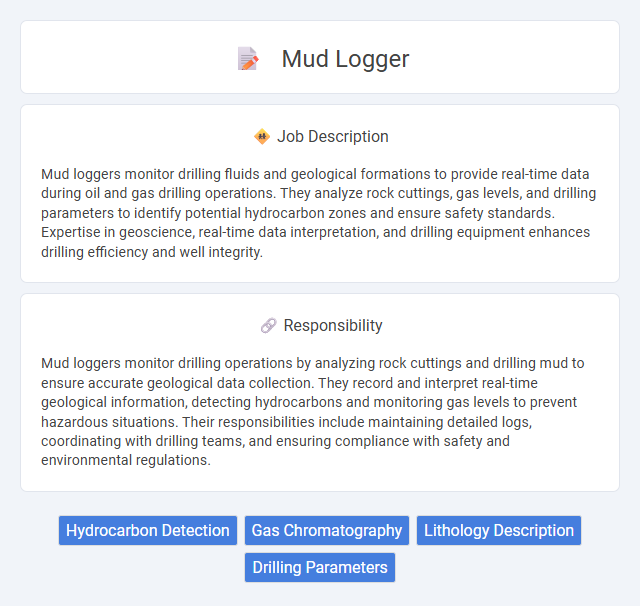
Mud loggers monitor drilling fluids and geological formations to provide real-time data during oil and gas drilling operations. They analyze rock cuttings, gas levels, and drilling parameters to identify potential hydrocarbon zones and ensure safety standards. Expertise in geoscience, real-time data interpretation, and drilling equipment enhances drilling efficiency and well integrity.
Individuals with strong attention to detail and the ability to work in physically demanding and often remote environments are likely to be suitable for a Mud Logger role. Those who can handle long hours, variable weather conditions, and maintain focus under pressure may find the job manageable and rewarding. It is probable that candidates lacking resilience or an interest in geological data analysis may struggle to adapt to this position.
Qualification
A Mud Logger typically requires a degree in geology, petroleum engineering, or a related field along with specialized training in drilling operations and data analysis. Proficiency in monitoring drilling parameters, collecting and interpreting rock cuttings, and using logging software is essential. Strong analytical skills and the ability to work in remote environments under demanding conditions are critical for ensuring accurate subsurface data collection.
Responsibility
Mud loggers monitor drilling operations by analyzing rock cuttings and drilling mud to ensure accurate geological data collection. They record and interpret real-time geological information, detecting hydrocarbons and monitoring gas levels to prevent hazardous situations. Their responsibilities include maintaining detailed logs, coordinating with drilling teams, and ensuring compliance with safety and environmental regulations.
Benefit
A Mud Logger job likely offers valuable benefits such as gaining hands-on experience in the oil and gas industry, which may enhance career growth opportunities. It probably provides exposure to advanced drilling technologies and real-time data analysis, contributing to skill development. The role might also include competitive compensation and potential for travel to diverse sites, appealing to individuals seeking dynamic work environments.
Challenge
The role of a Mud Logger likely involves managing complex data collection and monitoring tasks in unpredictable drilling environments, presenting significant challenges. Accurate analysis of drilling fluids and geological formations under time pressure could test problem-solving skills and technical expertise. Navigating safety risks while ensuring real-time data accuracy probably demands resilience and adaptability.
Career Advancement
Mud logger professionals gain valuable expertise in geological data collection and real-time drilling analysis, positioning them for advanced roles in the oil and gas industry. Mastery of mud logging technology and subsurface data interpretation can lead to promotions as drilling engineers, geological consultants, or petrophysicists. Continuous skill development and certification in geoscience software and safety protocols enhance career prospects and salary potential.
Key Terms
Hydrocarbon Detection
Mud logging professionals analyze drilling mud and rock cuttings in real-time to provide critical data on hydrocarbon presence and formation conditions. They employ advanced sensors and gas chromatographs to detect and quantify hydrocarbons, ensuring efficient resource evaluation and drilling safety. Accurate hydrocarbon detection by mud loggers significantly supports decision-making processes in oil and gas exploration and production operations.
Gas Chromatography
A Mud Logger plays a crucial role in monitoring drilling operations by analyzing rock cuttings and drilling fluid to assess formation properties and identify potential hazards. Gas Chromatography is essential in this process, enabling precise analysis of hydrocarbon gases dissolved in drilling mud, which helps detect gas shows and evaluate formation fluid composition in real time. Expertise in Gas Chromatography allows Mud Loggers to provide critical data for optimizing drilling safety and efficiency.
Lithology Description
A Mud Logger specializes in real-time monitoring and analysis of drilling mud to provide accurate lithology descriptions, essential for understanding subsurface formations. They identify rock cuttings and classify mineral compositions, contributing crucial data on sedimentary layers, porosity, and permeability. This information aids geologists and engineers in optimizing drilling operations and reservoir evaluations.
Drilling Parameters
Mud loggers monitor drilling parameters such as mud weight, flow rate, and gas levels to ensure optimal drilling performance and safety. They analyze real-time data from the drilling rig to detect formation changes, gas kicks, or equipment malfunctions, providing critical information to the drilling team. Accurate tracking of drilling parameters helps prevent blowouts and optimizes drilling efficiency in oil and gas exploration.
 kuljobs.com
kuljobs.com